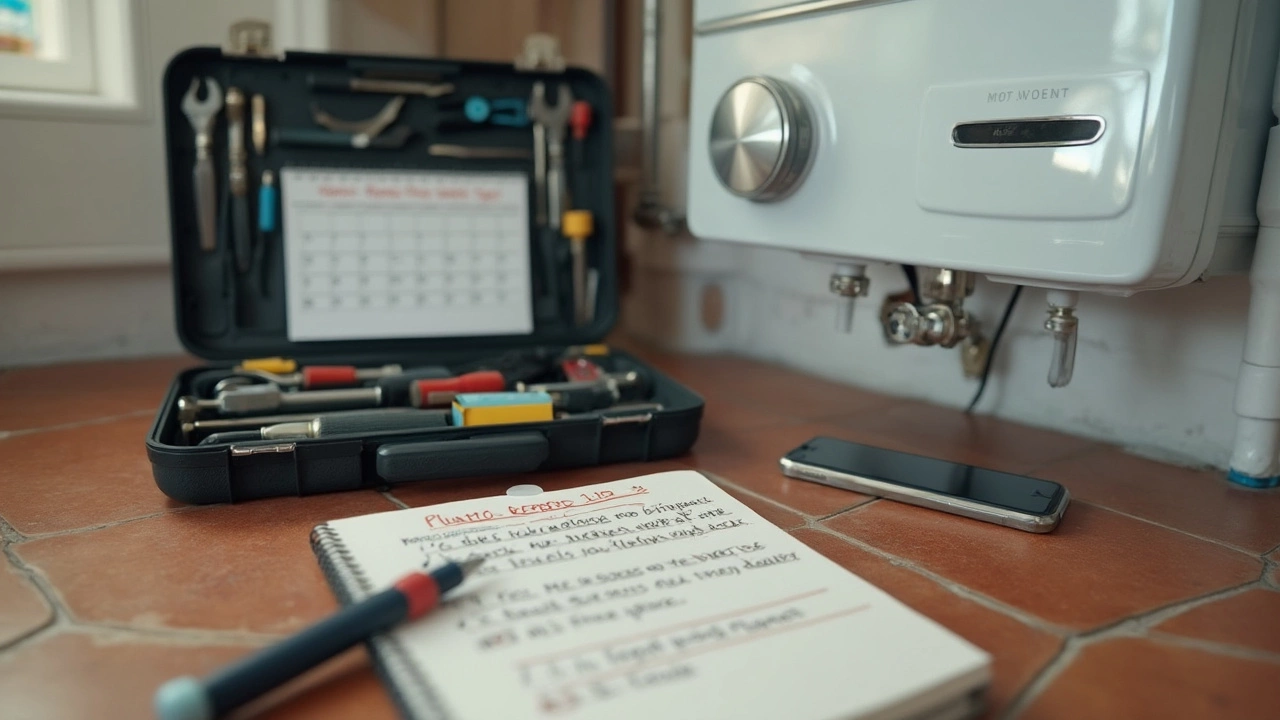If your boiler packs up, you want to know how long it'll take to get sorted—especially when hot showers and heating are on the line. Most boiler repairs can be done in about 30 minutes to 2 hours if it’s a straight-up issue like a broken thermostat, faulty pressure, or a worn-out part. But if things get complicated, like leaks inside the boiler or mysterious error codes, you could be looking at a half-day job or even a return visit with special parts.
Don’t assume all engineers work at the same pace. Some breeze through routine fixes because they've seen it all, while others might need to call in for extra help or order rare pieces. And just so you know, if your boiler is ancient or hasn’t had a service in years, there’s a good chance things won’t be as speedy as you hope.
- How Long Boiler Repairs Actually Take
- Factors That Change the Timeline
- What to Expect from the Engineer
- Tips to Get Your Boiler Fixed Faster
How Long Boiler Repairs Actually Take
The big question when your heat cuts out: just how long will a boiler repair take? Most stuff isn’t as drawn out as people expect. For simple problems—think pressure drops, dead thermostats, or stuck valves—it’s usually done and dusted in less than an hour. You might be without hot water a little longer if the engineer has to fetch a part, but if the repair truck is well-stocked, you could be back in business in under 90 minutes.
Then there's the messier jobs. Boilers making banging noises, mysterious leaks, or those with flashing error codes can push repairs past the two-hour mark. If something major, like a heat exchanger swap, is needed, engineers sometimes have to shut things down for half a day or more. The real pain comes if the part required isn’t in the van and needs to be ordered. Then, you're talking about waiting overnight, or even longer if it’s an older or less common boiler model.
Here’s a quick table with ballpark estimates on how long common repairs usually take, based on recent UK home repair surveys:
| Boiler Issue | Typical Fix Time |
|---|---|
| Replacing thermostat | 30-60 minutes |
| Fixing a leak | 1-2 hours |
| Ignition or pilot light problems | 45-90 minutes |
| Heat exchanger replacement | 3-5 hours |
| Replacing PCB (circuit board) | 2-4 hours |
| Pressure drop/top-up | 15-30 minutes |
One thing that really slows things down: waiting around for spares. If the part is rare, especially for older boilers, you might be looking at next-day delivery or even a week. Always ask the engineer if the part is on-hand or has to be ordered, so you know just how long you’ll need those extra blankets at night.
Factors That Change the Timeline
Boiler repair is not a one-size-fits-all job. A simple fix could have you toasty again in under an hour, but several things can quickly stretch out the process. Knowing what can delay things helps you plan better and keep stress levels down.
- Type of fault: Some issues, like low pressure or a faulty thermostat, are fast fixes. Major problems, such as heat exchanger leaks or electrical faults, are way more involved and can take half a day or longer.
- Parts availability: If the engineer has the part in the van, you’re laughing. But when the part is rare, it might need ordering. On average, special order boiler parts arrive in 1–2 business days in the UK, sometimes longer in rural areas or during busy winter spikes.
- Boiler brand and age: Modern models tend to have parts widely available. With an old or discontinued boiler, finding even basic bits can be like a treasure hunt. This can double—or even triple—repair time.
- Engineer skill: Some engineers are boiler ninjas and work quickly. Less experienced or less familiar techs might need more time diagnosing and fixing the issue.
- Access and safety: Boilers squeezed into tight cupboards or awkward corners are always harder to fix and add time. Safety checks at the end are also non-negotiable, especially for gas boilers.
Check out this quick comparison of typical fix times for common boiler faults:
| Fault Type | Average Fix Time |
|---|---|
| Pressure drop / simple reset | 15–30 minutes |
| Thermostat replacement | 30–60 minutes |
| Ignition failure | 1–2 hours |
| Heat exchanger leak | 2–4 hours (sometimes needs return visit) |
| PCB (circuit board) issue | 2–3 hours (plus delivery if no spare) |
The bottom line? If your boiler repair is simple, you could be back up and running the same day. But throw in part delays, tricky access, or a mystery fault, and it’s a waiting game. Always ask your engineer how long the fix is likely to take—most are happy to give a rough estimate upfront.

What to Expect from the Engineer
When a boiler repair engineer shows up, you’re not just getting someone with a wrench—you’re getting a trained pro who knows exactly where to look and what to check first. The first thing they’ll do is ask what problems you’ve noticed. Any odd noises, leaks, or blinking lights? Tell them everything, even if it sounds minor. It helps cut down the time they spend figuring things out.
Next, the engineer will get hands-on and run a bunch of checks. Here’s what usually happens on a typical visit:
- Test the boiler’s power and basic controls (so nothing simple is missed).
- Look for error codes on the display panel and check the manual, if needed.
- Inspect the pressure and water levels.
- Check key components like the pump, valves, fan, and thermostat.
- Search for visible leaks, corrosion, or blockages.
If you’ve got a common model, chances are pretty high that the engineer will have the right spare parts on hand. In fact, data from a 2024 UK boiler repair survey found 72% of jobs were finished in just one visit. But if you own something rare or super old, you might have to wait a day or two for a specific part to be ordered.
To give you an idea of what’s normal, here’s a quick rundown:
| Repair Type | Average On-Site Time |
|---|---|
| Thermostat replacement | 30-60 minutes |
| Fixing leaks | 45-90 minutes |
| Pump or valve swap | 1-2 hours |
| Complex diagnostics | 2-4 hours or more |
Always ask for a straightforward explanation about what’s wrong and what it’ll take to fix it. A good engineer will tell you what they’re fixing, what parts they’re swapping, and even if there’s a quick fix you could handle if it happens again. And before they walk out, they’ll make sure your heating and hot water work as they should. If your boiler repair needs a follow-up, you’ll often get clear instructions or an estimated return date—so no endless waiting by the phone.
Tips to Get Your Boiler Fixed Faster
No one likes waiting around in the cold. When your boiler’s on the blink, there are a few things you can do to speed things up and help the repair go smoothly.
- Boiler repair companies work faster when you give them all the info upfront. Tell the engineer exactly what’s gone wrong, when it started, and if there were any weird noises, smells, or leaks. Snap a photo of any error message or fault code on the display—it saves time diagnosing the problem.
- Clear space around your boiler. Move stuff out of the way so the engineer doesn’t have to climb over bikes, laundry, or dusty boxes. This sounds basic but plenty of people forget, and it eats into the repair time.
- If you’ve still got a warranty or service plan, mention it early. Some companies send out specialist engineers or can fast-track your job if you’re covered.
- Keep a record of the boiler model and how old it is. Parts for older or rare units can take longer to source, but if you know the exact model, parts can be found (or ordered) faster.
- Book during off-peak times if possible. Winter is the busiest season, especially right before a cold snap. If your boiler is being weird but hasn’t totally died, don’t wait for it to break down on the coldest day of the year. Sort it early and avoid the repair rush.
- Lastly, stay on top of your annual boiler service. Most engineers say that boilers that get checked yearly are less likely to need big repairs in the first place.
Bottom line: the more prepared you are, the quicker you’ll be back to hot showers and heated rooms.

